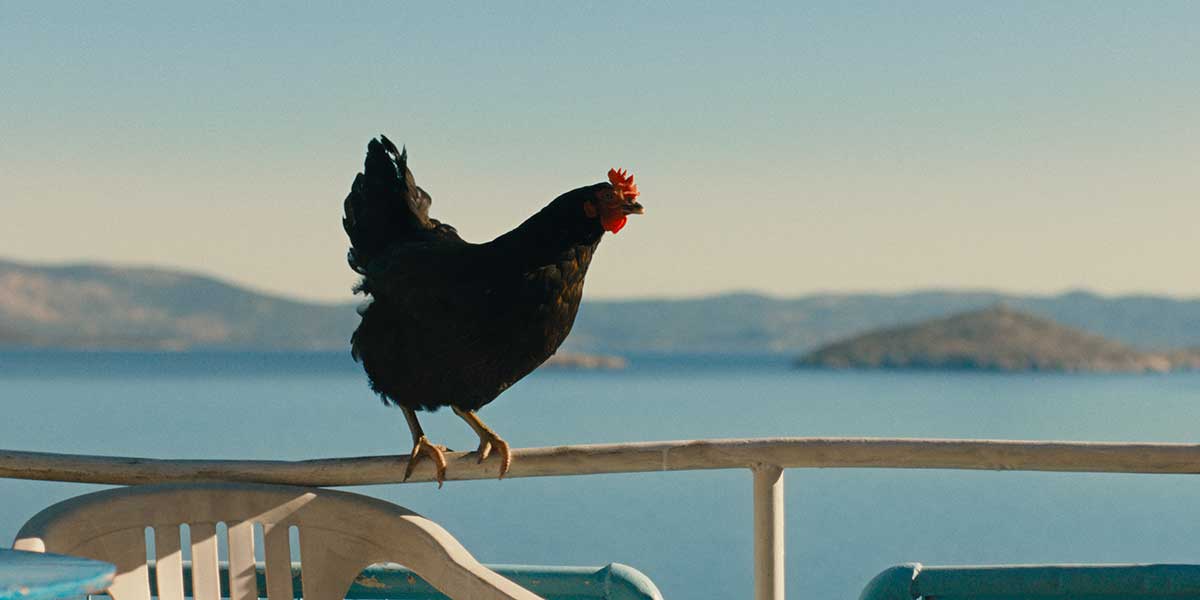A goofy comic thriller with a real-life female chicken as its star, Hen is a giddy career swerve for Hungarian writer-director György Pálfi, whose track record to date has leaned heavily on biting satire, surreal body horror and dystopian sci-fi.
Adding to the growing canon of animal-driven films, from Andrea Arnold’s ruminative bio-documentary Cow (2021) to Jerzy Skolimoski’s prize-winning donkey drama EO (2023), Pálfi’s eighth feature makes its European debut at San Sebastian film festival this week, fresh from its world premiere in Toronto, with slots at Hamburg and Rome to follow over the next few weeks.
Coralling together a cast of living, clucking, pecking animal actors instead of CGI effects, Hen is undoubtedly a technically impressive achievement. Pálfi’s eccentric paean to poultry power is also a formally bold experiment in shifting viewpoint, posing interesting questions about viewer empathy for non-human protagonists. But whether it has anything deeper to say behind its novelty surface appeal as a live-action twist on Chicken Run (2000) is debatable.
Hen was shot in Greece, with all-Greek dialogue, a decision partly born of necessity. Pálfi has a strong track record at home as an international feted film-maker and festiival fixture. Two of his early features, Hukkle (2002) and Taxidermia (2006), were Hungary’s official Oscar submissions. And yet he recently claimed he is no longer able to make films in his homeland “for political reasons”, presumably a reference to the Hungarian National Film Institute, which came under heavy-handed direct control of Viktor Orban’s government in 2019. The director has certainly criticised Orban in interviews and on screen before.
Arguably Hen could be read as a political allegory of sorts, though its subject matter is more general and universal, touching on animal rights, the European migrant crisis and the horrors of the chicken-industrial complex. It begins with an intimate close-up of our feathered heroine laying an egg in a grim food processing factory, where the imminent risk of death hangs over all the animal inmates. But thanks to a mix of pluck and luck, she escapes to the outside world with help from a kindly truck driver. New-found freedom brings different kinds of potentially lethal challenges, but Pálfi mostly plays this rambling opening act as a knockabout comic romp. Imagine if Mister Bean was a newly liberated chicken instead of an inept human.
Pálfi’s sunny animal adventure slowly turns darker after our heroine is adopted by a big-hearted restaurateur (Ioannis Kokiasmenos) who is busy refurbishing a run-down taverna called Panorama, perched high above the ocean. He shares the premises with his adult daughter (Maria Diakopanagioti) and her hot-tempered biker boyfriend (Argyris Pantazaras), who we come to learn is mixed up with a violent, people-smuggling criminal gang. As she settles into her idyllic new home, our curious protagonist somehow contrives to be on hand to witness key flashpoint moments between her human owners, from tragic accidents to police raids to bloody acts of revenge.
Hen initially plays like an audacious but slight exercise in comic whimsy, partly because Pálfi takes too long to settle on anything resembling a substantial plot. In fairness, the visual gags are frequently excellent: a slapstick scene involving the heroine running around under a cardboard box, for example, is pure Wallace and Gromit. But as background tensions come to dominate, the film becomes a more ironic, droll commentary on man’s inhumanity to man and the tragicomic empathy gap between species. Just as our plucky heroine finally appears to find domestic happiness, feuds turn bloody, scores are settled, and chickens literally come home to roost in an ironically upbeat finale which proves bleak for humans but great for animals.
A handsome overall package visually, Hen has a sumptuous colour palette, and is full of dynamic camera flourishes. Pálfi and his cinematographer Giorgos Karvelas devised a method of shooting low from a bird’s eye level, making strong use of gliding mobile shots to lend dramatic shape and momentum to a fairly scrappy plot, all punctuated by majestic aerial vistas of Greece’s rugged coastal landscape. Music plays a rich narrative role, Szabolcs Szoke’s folksy score interwoven with vintage easy-listening and pop-crooner tunes. A set-piece portrait of budding chicken romance set to a syrupy Italian love ballad is particularity well staged. Credit is also due to the work of animal trainer Árpád Halász and his feathered cast, including three “stunt chickens”, all called Jackie.
Director: György Pálfi
Screenwriters: György Pálfi, Zsófia Ruttkay
Cast: Ioannis Kokiasmenos, Maria Diakopanagioti, Argyris Pantazaras
Cinematography: Giorgos Karvelas
Editing: Lehmhényi Réka
Production designer: Konstantinos Zamanis
Music: Szabolcs Szoke
Producers: Thanassis Karathanos, Martin Hampel, Costas Lambropoulos, Giorgos Kiriakos
Production Companies: Pallas Film (Germany), View Master Films (Greece), Twenty Twenty Vision (Germany), Focusfox (Hungary)
World sales: Lucky Number, Paris
Venue: San Sebastian International Film Festival (Zabaltegi Tabaklera)
In Greek
96 minutes



